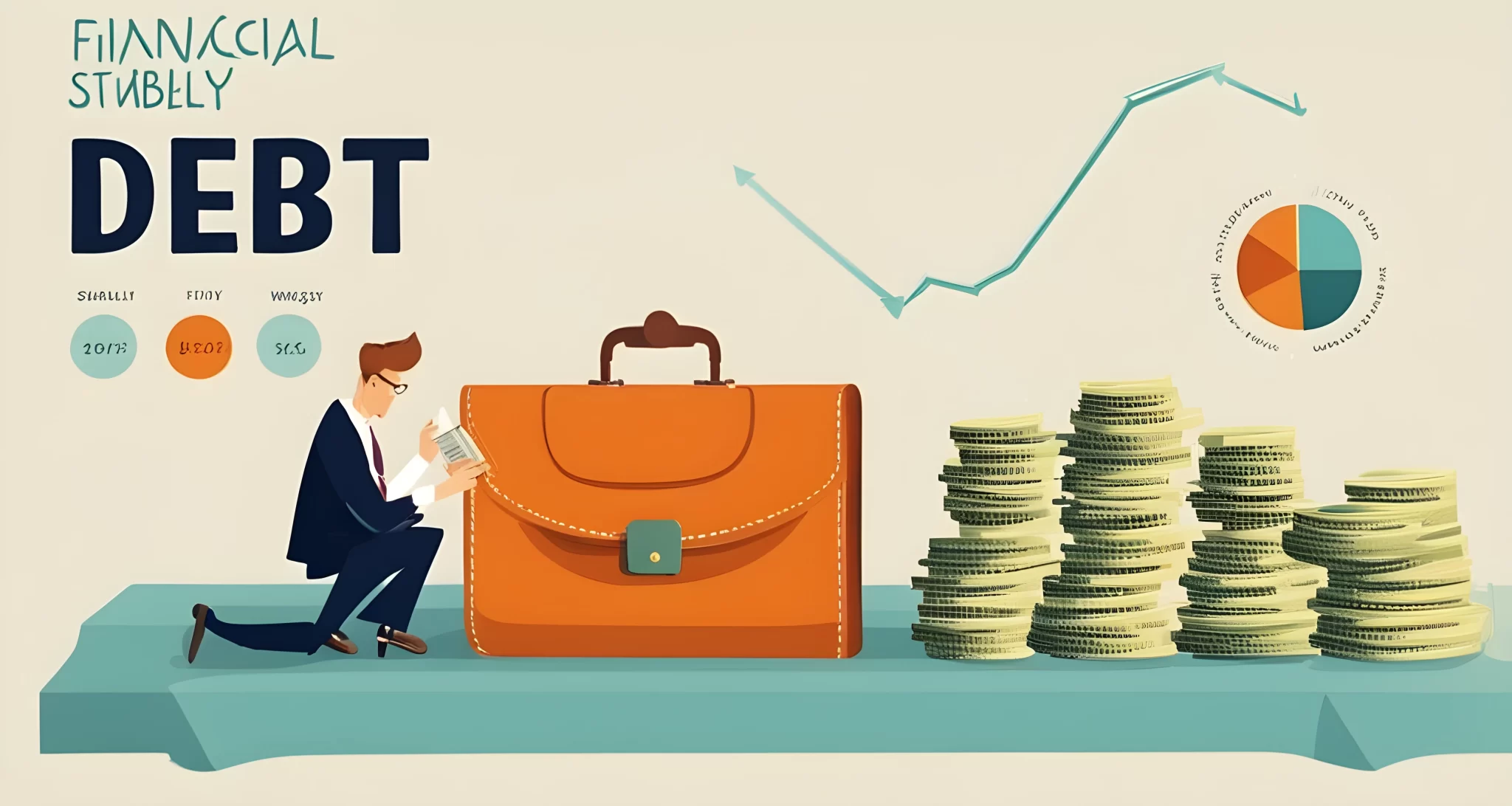What is Financial Stability?
Financial stability is a state of peace of mind around money, where you can comfortably pay your bills and live within your means without relying on loans or credit. It involves being responsible with debt, living within your means, and having an emergency fund for unexpected expenses. Achieving financial stability is important for reducing stress and anxiety related to money and for building a secure future.
To delve deeper into the concept of financial stability, it is essential to understand the importance of responsible debt management. This entails distinguishing between good debt and bad debt, as well as seeking professional financial advice to make informed decisions about managing debt wisely. In addition, it is crucial to consider the role of investment risk control in achieving financial stability. Managing risk effectively is key to investment success, as discussed in the article Investment Risk Control.
By implementing tips for managing debt wisely, individuals can work towards achieving financial stability. These tips include creating a budget, prioritizing high-interest debts, and avoiding unnecessary expenses. Furthermore, it is important to understand the difference between good debt, such as a mortgage or student loan, and bad debt, such as high-interest credit card debt.
In conclusion, attaining financial stability requires a combination of responsible debt management, living within one’s means, and seeking professional financial guidance. By following these principles and understanding the importance of investment risk control, individuals can work towards achieving a state of peace of mind around money and building a secure future.

The Importance of Responsible Debt Management
Responsible debt management is crucial for maintaining financial stability. It involves being cautious with the amount of debt you take on, making timely payments, and avoiding excessive borrowing. By practicing responsible debt management, individuals can ensure that their financial health remains strong and secure.
One of the key aspects of responsible debt management is building and maintaining a good credit score. This can lead to better loan terms and lower interest rates in the future, ultimately saving individuals money in the long run. In fact, a good credit score can open doors to various financial opportunities and benefits.
Additionally, having a clear plan for how you will repay your debts is essential for avoiding financial pitfalls. This includes creating a budget that prioritizes debt repayment and sticking to it diligently. By doing so, individuals can avoid falling into the trap of accumulating more debt than they can handle.
It’s also important to understand the difference between good debt and bad debt. Good debt, such as a mortgage or student loans, can be seen as an investment in one’s future, while bad debt, such as high-interest credit card debt, can be detrimental to financial stability. By being mindful of the types of debt they take on, individuals can make more informed decisions about their financial well-being.
For those who may struggle with managing their debts, seeking professional financial advice can be incredibly beneficial. Financial advisors can provide guidance on creating a realistic repayment plan and offer strategies for improving overall financial management.
In conclusion, responsible debt management is an essential component of maintaining financial stability. By being mindful of the amount of debt taken on, making timely payments, and having a clear repayment plan in place, individuals can ensure their long-term financial health. Additionally, seeking professional guidance when needed can provide valuable support in managing debts effectively. For more information on risk management in business Risk management in business.

Good Debt vs Bad Debt
When it comes to managing debt wisely, it’s crucial to understand the difference between good debt and bad debt. Good debt, such as loans for education, business, or homeownership, can actually be beneficial for building wealth and improving financial stability in the long term. For example, taking out a student loan to invest in your education can lead to higher earning potential and career opportunities down the line.
On the other hand, bad debt, like high-interest credit card debt or financing purchases of depreciating assets, can seriously damage your financial health. It’s important to avoid accumulating bad debt whenever possible, as it can lead to a cycle of high-interest payments and financial stress.
To make informed decisions when taking on debt, consider seeking professional financial advice from experts in the field. They can help you understand the long-term implications of different types of debt and assist you in creating a plan for managing it responsibly.
Ultimately, managing debt wisely involves being able to differentiate between good and bad debt. By understanding the potential benefits and pitfalls of each type of debt, you can make informed decisions that align with your long-term financial goals.
For more information on making sound financial decisions, check out our article on ROI strategies for newcomers. Understanding how to invest wisely can also play a crucial role in building wealth and achieving financial stability.
By being mindful of the types of debt you take on and seeking expert advice when needed, you can work towards maintaining a strong financial foundation and achieving long-term stability.

Tips for Managing Debt Wisely
When it comes to managing debt wisely, there are several strategies that can help individuals take control of their financial situation. These tips can make a significant impact on reducing debt and improving overall financial stability.
Debt Consolidation
One effective strategy for managing debt is debt consolidation. This involves combining multiple debts into a single loan with a lower interest rate. By doing so, individuals can simplify their repayment process and potentially save money on interest payments Increase Investment Returns.
Negotiate Lower Interest Rates
Another approach is to negotiate with lenders for lower interest rates. Many creditors are willing to work with borrowers to create a more manageable repayment plan. By reducing interest rates, individuals can lower the overall cost of their debt and accelerate the repayment process.
Create a Realistic Budget
Developing a realistic budget that prioritizes debt repayment is crucial for managing debt wisely. By carefully tracking income and expenses, individuals can identify areas where they can cut back on spending and allocate more funds towards paying off debts. A structured budget provides a clear roadmap for achieving financial stability.
Avoid Taking on New Debt
It’s important to avoid taking on new debt whenever possible. This means resisting the temptation to use credit cards for unnecessary purchases and being mindful of living within one’s means. By focusing on paying off existing debts before taking on new ones, individuals can prevent their financial situation from worsening.
Seek Professional Financial Advice
Finally, seeking the advice of a financial advisor can provide valuable insights and guidance for managing debt effectively. A professional can offer personalized strategies for debt management, as well as provide additional resources and support.
In conclusion, implementing these tips for managing debt wisely can make a significant difference in achieving financial stability. By utilizing strategies such as debt consolidation, negotiating lower interest rates, creating a realistic budget, avoiding new debt, and seeking professional advice, individuals can take proactive steps towards reducing their debt burden and building a more secure financial future.

Seeking Professional Financial Advice
When it comes to managing complex financial issues, seeking advice from a professional financial advisor can be incredibly beneficial. Financial advisors have the knowledge and expertise to provide personalized guidance based on your individual financial situation. They can help you create a comprehensive debt management plan and offer strategies for improving your overall financial stability.
By seeking professional financial advice, you can make informed decisions that will help you achieve and maintain financial well-being. A financial advisor can help you understand the difference between good debt and bad debt, and provide tips for managing debt wisely. They can also assist you in setting realistic financial goals and developing a plan to achieve them.
In addition, a professional financial advisor can offer money-saving advice that can help address any financial strain you may be experiencing. By implementing their recommendations, you can take steps towards building an emergency fund or increasing your savings Money-saving advice.
Overall, the expertise of a financial advisor can be instrumental in helping you navigate the complexities of personal finance. Whether you are looking to pay off debt, build an investment portfolio, or plan for retirement, seeking professional guidance can make a significant difference in your financial well-being. Don’t hesitate to reach out to a financial advisor for assistance with your financial goals and challenges. Their expertise and personalized advice can help put you on the path towards long-term financial stability.
FAQ
What is financial stability?
Financial stability is a state of peace of mind around money, where you can comfortably pay your bills and live within your means without relying on loans or credit.
How can i build wealth with debt?
Good debt, such as loans for education, business, or homeownership, can help build wealth by investing in assets that appreciate in value over time.
What is considered bad debt?
Bad debt includes high-interest credit card debt or purchases of depreciating assets, which can negatively impact your finances.
How can i manage debt wisely?
To manage debt wisely, consider debt consolidation, negotiating with lenders for lower interest rates, or seeking professional advice from a financial advisor.
